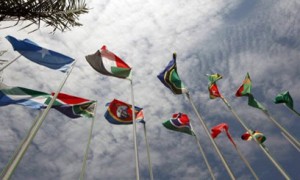
(AFP Photo)
The Egyptian authorities’ progress in restoring “constitutional order” to the country played a role in the African Union (AU)decision recommending lifting its almost year-long suspension.
In its final report, the high-level panel said its recommendation was driven by the “need for the AU to remain engaged with Egypt”. The panel added it was “to accompany efforts of the Egyptian authorities for the full implementation of the roadmap”.
The report, which included a summary of diplomatic and domestic developments following former President Mohamed Morsi’s ouster, detailed recommendations to the Egyptian government in light of the lifted suspension.
“For Egypt to have a realistic prospect of realising the democratic aspirations of its people, there is a need to promote a political process that is representative of all sections of Egyptian society, so long as they are committed to peaceful political dialogue,” recommended the panel. It urged Egyptian stakeholders to widen the political space “to allow greater political pluralism and organisation of peaceful political opposition”.
The new government’s first step to democratisation, said the panel, was the creation of conditions for transparent parliamentary elections, slated to take place later this year. The AU panel called the upcoming elections an opportunity “to achieve greater inclusivity and political pluralism in the country”.
It called on authorities to amend the current parliamentary elections draft law. It warned having 75% of parliamentary seats voted through individual ballots (rather than party lists) would likely deprive ‘underprivileged‘ voters of their chance of winning the elections. This is especially so given the high costs of running for the elections individually.”
The report also addressed Egypt’s human rights situation, saying the “situation could seriously damage the country’s image” and called on the government to strengthen its National Human Rights Council. It also requested the Egyptian government grant the African Commission on the Human and Peoples’ Rights to “undertake an assessment of the human rights situation” in Egypt.
The panel discussed elaborating its guidelines on “unconstitutional changes of government”, the cause of Egypt’s suspension last year.
It recommended that guidelines include “the descent of the government into total authoritarianism to the point of forfeiting its legitimacy”, along with the “total ineffectiveness of constitutional process”. It added that the African Union should also take popularity and peacefulness of uprisings into account, along with the “absence of involvement of the military in removing the government”.
Earlier this week, the AU lifted Egypt’s suspension from the Peace and Security Council (PSC).
Egypt’s Foreign Ministry said that it “welcomed…the [unanimous] decision to return Egypt to its natural place within the Union and to resume its participation in the activities of the African Union”.
The PSC originally suspended Egypt after it deemed Morsi’s ouster as unconstitutional and in violation of the AU Charter.
In January the High Level Panel, headed by Alpha Oumar Konaré, former President of Mali, “affirmed the correctness” of the July 2013 decision to suspend Egypt’s activities within the Union. Konaré and the panel outlined the reasons behind the statement when it presented a progress report to the PSC.
The three-man panel have visited Egypt three times since the suspension was put in place. They were also among a select few granted an audience with Morsi in July, who was then being held in an undisclosed location.
The panel said in January that it hoped Egypt’s elections would mark the end of the transition period.
The AU dispatched an Election Observation Mission to Egypt for last month’s presidential elections. Despite criticism of the electoral climate, the preliminary statement praised the election process, rating it good or very good in most cases. The mission stressed that it was independent from AU decisions on the matter of Egypt’s membership status.



